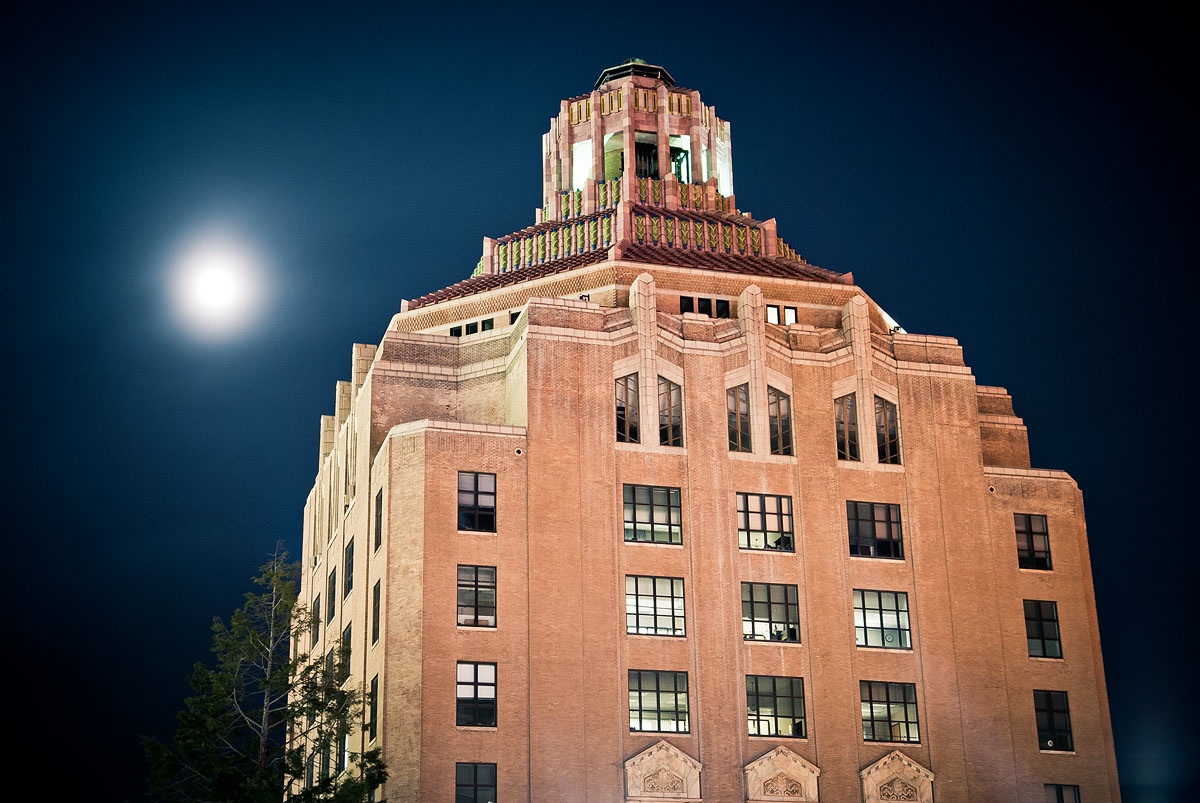


Behind a very general agenda, two meals and lots of debate over wording, Asheville’s leaders are about make some big decisions for the year
Above: City hall by moonlight. Photo by Max Cooper.
It’s not on the main page of the city’s website. Or their calendar of meetings (though the agenda just went up this afternoon). But at 9 a.m. tomorrow morning, one of the most important government get-togethers of the year will take place. Asheville City Council will make its way down to the U.S. Cellular Center banquet hall where, after eating a continental breakfast, they’ll proceed to spend the rest of the day at their annual retreat, listening to staff presentations, going back-and-forth over the exact wording of their commitment to things like “safety” and “affordability.”
Despite the name, this retreat isn’t a getaway, at least not in recent years. It takes most of a working day and usually just attracts an audience of reporters, political gadflies, future candidates for office (especially if it’s an election year, which it is), non-profit reps and the occasional general observer.
The agenda’s pretty general and in the oft-repeated words of city staff, it’s intended to be a “30,000-ft. view” of what the city’s facing. There will be the usual “break-out sessions” to divide Council and some of the attendees into smaller groups around certain issues, rather than a single time for public comment. The elected officials will also hash out their strategic plan which is, again, pretty general. If you want a handy guide to some of the jargon they’ll use in abundance, we’ve got you covered.
On the face of it, this all seems like pretty general stuff, mostly of interest to us urban policy masochists. But a lot of big decisions get made — or at least a general direction is set — at the retreats. If you’re wondering why Asheville suddenly stopped having Bele Chere, that decision was essentially made at the 2013 retreat and last year’s saw a decision to add Sunday bus service and a tense rundown of relations with Raleigh.
Part of the retreat’s importance is because while any decisions have to get a vote at those regular public meetings that get significantly more attention, this is one of the few times in the year where the entire Council gets to discuss broad topics and bring up concerns. So it creates a space where the group can quickly reach consensus (if one exists) or brainstorm new proposals in a way that the usual time constraints don’t allow for, so some big issues can get brought up and some sense given to both staff and other Council members if they’ll fly. Hence a general discussion about getting “return on investment” ends with a decision to get rid of Bele Chere.
Another main reason the retreats are so important is that some of the biggest things city leaders decide on never come up for a standalone vote; they’re instead part of the annual budget Council passes in early summer.
Last year the city’s annual budget totaled $147 million. This retreat is a major time for Council members to start telling staff (or, plenty of times, staff telling Council) where they want to spend that money. This is where the rubber meets the road on something affecting every person in the city (if you can’t think of something to spend part of $147 million on, you’re not trying). It’s going to affect sidewalks, housing, the bus system, law enforcement, the arts and even possible raises for those city workers that aren’t making a living wage (many of whom, incidentally, work where Council’s having the retreat).
Because there are so many areas in the budget, it’s pretty typical for Council members to name their priorities at the retreat and see staff bring those back in the Spring when they start drawing up the numbers for the coming year. That’s how, for example, after public campaigns a few weeks before last year’s retreat pushing for improved bus service, Council ended up making Sunday bus service a priority.
As the retreat takes place during the workday (and, as noted earlier, isn’t exactly highly publicized), many Ashevillians can’t attend. Though, if you can, I certainly encourage it. In the meantime, we’ll have the usual live coverage at #avlgov on Twitter, and some dissection here later on. It’s going to be an interesting year.
—
The Asheville Blade is entirely funded by its readers. If you like our work, donate directly to us on Patreon. Questions? Comments? Email us.